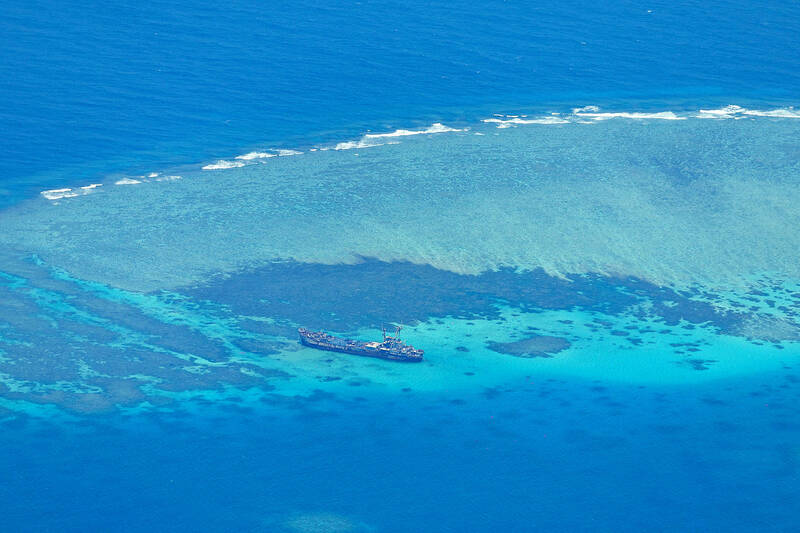Chinese naval and air forces conducted patrols around a flashpoint reef in the South China Sea yesterday, after a slew of tense encounters with the Philippines over the past few months.
The patrols coincided with joint exercises carried out by the US, Australia, Japan, New Zealand and the Philippines in Manila’s exclusive economic zone and within the South China Sea.
Beijing claims almost the entire South China Sea, brushing off rival claims of several countries, including Taiwan and the Philippines, and an international ruling that its assertion has no legal basis.

Photo: Reuters
Its claims include the waters around Scarborough Shoal (Huangyan Island, 黃岩島) — which Beijing seized from Manila in 2012 — where the Chinese People’s Liberation Army’s Southern Theater Command yesterday said it held air and sea patrols.
The triangular chain of reefs and rocks is 240km west of the Philippines’ main island of Luzon and about 900km from the nearest major Chinese land mass of Hainan.
Beijing said the training activities around the shoal included “reconnaissance, early warning, and air-sea patrols.”
“Certain countries outside the region are stirring up trouble in the South China Sea, creating instability in the region,” the Southern Theater Command said in a statement.
“China holds indisputable sovereignty over Huangyan Island and its adjacent waters,” it added.
The Japanese Ministry of Defense in a statement said that a joint drill involving the five countries took place in the South China Sea.
Its maritime destroyer Sazanami participated in the exercises, the ministry said.
The US said the maritime exercises conducted with its allies demonstrated “a collective commitment to strengthen regional and international cooperation in support of a free and open Indo-Pacific.”
The Australian Department of Defence said that the HMAS Sydney and a Royal Australian Air Force P-8A Poseidon maritime patrol aircraft were participating in exercises aimed at “upholding the right to freedom of navigation and overflight.”
Tensions between China and the Philippines have flared in the past few months during a series of confrontations in the waters around the contested Second Thomas Shoal (Renai Shoal, 仁愛暗沙) and Sabina Shoal (Xianbin, 仙濱暗沙).
In July, the two sides said they had reached a provisional deal on resupply missions to a Philippine ship, the Sierra Madre, which is grounded on the Second Thomas Shoal with a garrison on board, aimed at asserting Manila’s claims to the reef.
Beijing on Friday said it had “supervised” a Philippine ship as it delivered supplies as part of a resupply mission to the grounded vessel at the shoal.

The US government has signed defense cooperation agreements with Japan and the Philippines to boost the deterrence capabilities of countries in the first island chain, a report by the National Security Bureau (NSB) showed. The main countries on the first island chain include the two nations and Taiwan. The bureau is to present the report at a meeting of the legislature’s Foreign Affairs and National Defense Committee tomorrow. The US military has deployed Typhon missile systems to Japan’s Yamaguchi Prefecture and Zambales province in the Philippines during their joint military exercises. It has also installed NMESIS anti-ship systems in Japan’s Okinawa

‘WIN-WIN’: The Philippines, and central and eastern European countries are important potential drone cooperation partners, Minister of Foreign Affairs Lin Chia-lung said Minister of Foreign Affairs Lin Chia-lung (林佳龍) in an interview published yesterday confirmed that there are joint ventures between Taiwan and Poland in the drone industry. Lin made the remark in an exclusive interview with the Chinese-language Liberty Times (the Taipei Times’ sister paper). The government-backed Taiwan Excellence Drone International Business Opportunities Alliance and the Polish Chamber of Unmanned Systems on Wednesday last week signed a memorandum of understanding in Poland to develop a “non-China” supply chain for drones and work together on key technologies. Asked if Taiwan prioritized Poland among central and eastern European countries in drone collaboration, Lin

NO CONFIDENCE MOTION? The premier said that being toppled by the legislature for defending the Constitution would be a democratic badge of honor for him Premier Cho Jung-tai (卓榮泰) yesterday announced that the Cabinet would not countersign the amendments to the local revenue-sharing law passed by the Legislative Yuan last month. Cho said the decision not to countersign the amendments to the Act Governing the Allocation of Government Revenues and Expenditures (財政收支劃分法) was made in accordance with the Constitution. “The decision aims to safeguard our Constitution,” he said. The Constitution stipulates the president shall, in accordance with law, promulgate laws and issue mandates with the countersignature of the head of the Executive Yuan, or with the countersignatures of both the head of the Executive Yuan and ministers or

BACK TO WORK? Prosecutors said they are considering filing an appeal, while the Hsinchu City Government said it has applied for Ann Kao’s reinstatement as mayor The High Court yesterday found suspended Hsinchu mayor Ann Kao (高虹安) not guilty of embezzling assistant fees, reducing her sentence to six months in prison commutable to a fine from seven years and four months. The verdict acquitted Kao of the corruption charge, but found her guilty of causing a public official to commit document forgery. The High Prosecutors’ Office said it is reviewing the ruling and considering whether to file an appeal. The Taipei District Court in July last year sentenced Kao to seven years and four months in prison, along with a four-year deprivation of civil rights, for contravening the Anti-Corruption